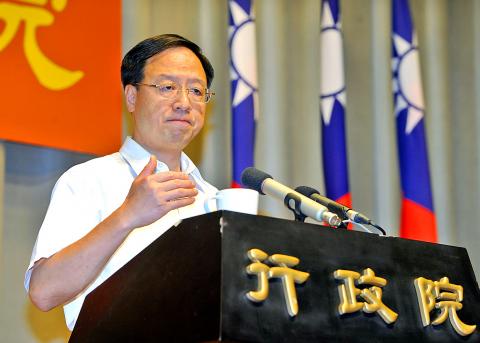Premier Jiang Yi-huah (江宜樺) yesterday said the government would “not go soft on the food safety problem” and would do everything in its power to root out food manufacturers producing adulterated foodstuffs.
“Shortages of lard will be solved by the emergency measure of relaxing rules on importing lard from countries such as Japan and Spain,” he told a press conference, reiterating the government’s determination to clamp down on the production of tainted food.
Jiang said it was confirmed in the Ministry of Health and Welfare’s latest inspection report that Ting Hsin Oil and Fat Industrial Co, a subsidiary of Ting Hsin International Group, had imported oil meant for animal feed from Vietnam and is therefore suspected of food adulteration and counterfeit.

Photo: Liao Chen-huei, Taipei Times
The Vietnamese government was contacted to confirm that the Vietnamese factory had not been manufacturing cooking oil, Jiang added.
The manufacturers that have been implicated in the recent scandal are major producers and wield great influence, “but the government will not go soft on them, regardless of their scale and market share,” Jiang said.
Because the strict measures might impose certain restraints and have repercussions on the domestic food and oil markets — after many downstream products had to be pulled off shelves in the past week and more are to be cleared from the market in the next week — consumers might encounter lard shortages in the near future, but the government would come up with supporting measures, Jiang said.
The Ministry of Economic Affairs, the Ministry of Finance, the Council of Agriculture and other related agencies convened on Friday and decided “to lift the restrictions on the importation of lard from countries such as Japan, Spain and other developed countries,” Jiang said.
“Certification and inspection work on those products will be done with care, and the tariffs will be adjusted accordingly in order to have domestic traders import the products as soon as possible and to avoid lard shortages,” he said. “The upstream materials needed for lard making will also be quickly imported as an emergency measure overseen by the council.”
As the public takes transparency seriously, Jiang said he has also required the health ministry to make public a list of companies and products suspected of using tainted oil as soon as possible.

The brilliant blue waters, thick foliage and bucolic atmosphere on this seemingly idyllic archipelago deep in the Pacific Ocean belie the key role it now plays in a titanic geopolitical struggle. Palau is again on the front line as China, and the US and its allies prepare their forces in an intensifying contest for control over the Asia-Pacific region. The democratic nation of just 17,000 people hosts US-controlled airstrips and soon-to-be-completed radar installations that the US military describes as “critical” to monitoring vast swathes of water and airspace. It is also a key piece of the second island chain, a string of

A magnitude 5.9 earthquake that struck about 33km off the coast of Hualien City was the "main shock" in a series of quakes in the area, with aftershocks expected over the next three days, the Central Weather Administration (CWA) said yesterday. Prior to the magnitude 5.9 quake shaking most of Taiwan at 6:53pm yesterday, six other earthquakes stronger than a magnitude of 4, starting with a magnitude 5.5 quake at 6:09pm, occurred in the area. CWA Seismological Center Director Wu Chien-fu (吳健富) confirmed that the quakes were all part of the same series and that the magnitude 5.5 temblor was

The Central Weather Administration has issued a heat alert for southeastern Taiwan, warning of temperatures as high as 36°C today, while alerting some coastal areas of strong winds later in the day. Kaohsiung’s Neimen District (內門) and Pingtung County’s Neipu Township (內埔) are under an orange heat alert, which warns of temperatures as high as 36°C for three consecutive days, the CWA said, citing southwest winds. The heat would also extend to Tainan’s Nansi (楠西) and Yujing (玉井) districts, as well as Pingtung’s Gaoshu (高樹), Yanpu (鹽埔) and Majia (瑪家) townships, it said, forecasting highs of up to 36°C in those areas

Taiwan will now have four additional national holidays after the Legislative Yuan passed an amendment today, which also made Labor Day a national holiday for all sectors. The Chinese Nationalist Party (KMT) and Taiwan People’s Party (TPP) used their majority in the Legislative Yuan to pass the amendment to the Act on Implementing Memorial Days and State Holidays (紀念日及節日實施辦法), which the parties jointly proposed, in its third and final reading today. The legislature passed the bill to amend the act, which is currently enforced administratively, raising it to the legal level. The new legislation recognizes Confucius’ birthday on Sept. 28, the